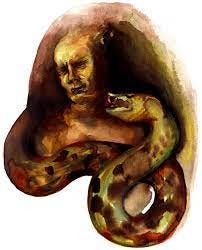1- In Colum McCann’s new novel Twist, everyone is always alone. The story turns on the paradox of the solitary central character, Conway, who leads teams of solitary technical experts on lonesome gray ships that search for and reconnect the severed sections of undersea cables which connect us to the internet. They seal their (and our) lonely fate in pursuit of such reconnecting. Our contemporary crisis of loneliness and social fragmentation is exacerbated by, if not anchored in, a technology that was supposed to connect us, even to make us all “friends”.
2 - The relationship between being and seeming—“être et paraître” in existentialist French—is central to human affairs. There was always supposed to be an organic connection, a creative tension between the two. But in the early mid-21st century, that connection has been severed. In our world, it is almost axiomatic that what seems to be is not, and that what is is nowhere in sight. To use a verb made familiar by recent misusage, representation has obliterated reality.
3 - Today’s emperor of ice cream is emperor of something less tangible and sweet. Let seem be finale of be1 instead. The image of the thing always trumps the thing itself. Not only that, the image might be of something else entirely. At what long-term cost such misrepresentation? Or has it always been thus?
4 - Everyone everywhere is always looking at screens, even when strolling on a boardwalk by the beach. Instead of looking up at the expanse of the sky itself, we prefer the screen version of sky. The same goes for mountains and blackbirds.
5 - If I understood correctly from his recent podcast conversation with the conservative columnist Ross Douthat, tech bro billionaire power broker Peter Thiel (who owns the Vice President, among others) believes we are mired in a period of technological stagnation. Liberal democracy is bent on preserving a placid status quo and filing down risk to near non-existence. A life without risk amounts to the obliteration of experience. In that sense, our democracy is a hollow husk, exhausted, and should itself be obliterated. The current president is an errant missile of obliteration. From liberal democracy’s ruins shall rise the Phoenix of the transhuman conqueror of distance and disease, of aging, of limits of any kind. This strikes me as supreme techno-Utopian thinking. To the degree I understood it, I was not sure I agreed. Limits, within limits, make life worth living. There are tradeoffs to everything, including the pursuit of limitlessness. Haven’t we learned from recent experience about the need to assess these tradeoffs from an ethical perspective, or face the risk of tragic, unintended, even self-subverting consequences? Or has technology tricked us once again (how quickly we forget) into believing we have transcended the need for ethical assessments of any kind?
6 - As I ponder the ambitions of those presumed visionaries who see an interplanetary future for humanity or bust, I wonder whether I would have been among Christopher Columbus et al’s critics; in light of competing priorities, I might well have been skeptical about far-flung exploration beyond the known world. It’s more likely my ancestors would have known little or nothing about any such plan, and cared even less. Does the true trouble begin when humans have no further geographic space to expand into, no escape valve with which to release the rising pressure of our irrepressible ambition. Hence, the importance of Mars, or the idea of Mars.
7 - Have you ever wondered whether you might be wrong about everything? Fooled by the randomness of your own limited experience and unrepresentative exposure? For example, I lived in Japan for two years in the late 80s, and was convinced I was seeing the country of the future at the time. That’s one reason I chose to pursue a Masters Degree in Japan studies. I gained a deep respect for Japan, Japanese culture, society, art etc. in the process, but things turned out somewhat differently than I had thought. In fact, things are still turning now. Becoming something else. So what am I wrong about these days? (It could be anything or everything.) By the way, just because you might be wrong doesn’t mean that someone who disagrees with you, and holds a different view, is right.
8 - A dilettante’s dilettante, I sometimes see American political history as moving within a dialectical-type frame: thesis, anti-thesis, synthesis. Each successive president (I’m hardly alone in saying this) marks a response, an inversion, a counterpoint to his predecessor. That counts for the current incumbent too, the synthesis to his own thesis. If this is the case, we should expect a future counter or correction, which would (paradoxically perhaps) run counter to a narrative of decline, or for that matter renewal. I’m not sure in which direction the arc of history is bending, or if this latest twist will break it. Are you?
9 - California, where I’m from and from where I’m writing, pioneered direct democracy with its so-called ballot initiatives. Let the people themselves decide what they want by voting directly on the issue, and be themselves responsible for the result. The problem is that most issues in the modern world are complicated, involving intricate tradeoffs that are difficult to disentangle. Few people have the time or inclination to study and appreciate the practical implications of the propositions in question. This gives disproportionate power to highly motivated and resourced special interests who propose the initiatives and sell them with one-sided, tendentious appeals that misrepresent the core questions. For this reason, on balance I've always preferred our prevailing system of representative democracy. The professionals we elect to represent us presumably have the time and the inclination to study and appreciate the complicated issues we face, and to carefully calibrate the interests of their constituents—we the people—in disentangling the conflicts and casting their votes one way or the other. The problem is that these representatives, too, are enticed by money or favors etc. to pursue particular interests at the expense of the people. Unless we remove money from politics altogether, this kind of structural corruption is essentially inescapable.
10 – Fat chance, under current circumstances. The 1976 Buckley v. Valeo Supreme Court decision equated spending money with free speech, enjoying full protections under the first amendment. The 2010 Citizens United Supreme Court decision radically expanded the free speech protections afforded to campaign and other political spending. This opened the floodgates to money of all kinds—light, dark, and in-between—pouring like a torrent into politics, essentially legalizing political corruption. This is one of several reasons I’m skeptical the Supreme Court represents a bulwark for our embattled democracy.
11 - In some ways the president is the quintessential reflection of the current environment—of seeming over being, of image obliterating reality, of politics as the unrestricted expenditure of money by money for money, of bald-faced structural corruption. This is the main reason such a perverse person can be sold—and be seen by so many—as a divine savior, precisely the reverse of what he actually is: the perfect Dantesque personification of fraud in the 8th circle of hell. I really worry about the long serpent’s tail behind the transparently fake smile and falsely sturdy shoulders and the deadly scorpion sting at the forked tip of it.2
12 - Speaking as a former American diplomat (for what that’s worth), I struggle to make sense of current events in terms of U.S. national interests, the terms American diplomats tend to think in with respect to current events. How does destroying government institutions, universities, scientific research, the development of alternative energy sources, strategic alliances, international agreements, due process, domestic legal protections, our reputation for freedom, openness, and fair play etc. make sense? The accumulation of personal wealth and power on the part of the president and his entourage only goes so far as a compelling explanation. Whom else does it benefit? The true-believer alt-right ideologues who view the so-called administrative state with the passionate intensity of impassioned suspicion? Maybe. For my part, I sometimes think the Occam’s razor hypothesis—that our president is the undeclared agent of an enemy power—brings together these otherwise puzzling, seemingly nonsensical elements in a way makes more sense than other best guesses do. But apart from the practical consequences, there is reportedly no “evidence” for it.
13 - The recently passed massive budget-busting legislation which, true to the seeming over being, reality-obliterating parameters of the current environment, was called “One Big Beautiful Bill” by our president, embodies almost everything I’ve noted up to now. If one can believe opinion polls of all stripes, I’m perplexed by the bill’s purported unpopularity. If the democratically elected representatives of the people know that most of the people they represent oppose it, how could they vote in favor of it? Either the polls are mistaken about public opinion (again) or our democratic representatives voted on behalf of something other than their constituents’ perceived interests. If so, what is it? The emotional satisfaction of owning the cultural opposition? Craven bowing to a higher secular power? I suppose it’s also possible that our professional representatives (those who supported the bill, in any case) know better than the people do, and are leading by brave and wise example. But I’m not convinced. Are you?







A very compelling piece, and your most important point is this one: "How does destroying government institutions, universities, science, the development of alternative energy sources, strategic alliances, international agreements, due process, domestic legal protections, our reputation for freedom, openness, and fair play etc. make sense?" The answer is obvious: It doesn't make sense. It's an agenda driven by revenge, by self-aggrandizement, by the pursuit of wealth, and by a need to be at the center of attention in all things. What is the Administration's plan to meet the moment, to reduce the cost of health care and education, train American kids for the jobs of the future, build up our infrastructure?
Christ Alec, sounds like our ride to Hell in a handbasket is accelerating.
My response is a dismal combination of the Ostrich, and pass the buck. That is, I spend much of my time deep in the mountains (real ones, not internet peaks), and then I'll pass on a few bucks to various groups and people who I know are doing good work. "Re-elect Jon Ossoff", etc.
"Complacency kills", right? Well we all are born with a death sentence, and that includes planet Earth and the Sun. Taking the long view out into space is, I think, cathartic for me, Alexis, but that is one of those questionable points, and you make me wonder if I may be wrong.
Our Aussie friend Shaun, who is a political animal like you, told me once that "Everything is political... buying your pants is political..." He's right isn't he? And my cherished National Parks and Forests exist due to political acts. It is a lot easier to be less engaged when the ship of state is sailing along more smoothly.
Anyhow, I am rambling Alec. I appreciate the thread that runs through your latest fine essay-- that we need to question our thoughts and actions. I also really admire your willingness to continue your deep engagement in political diplomacy at this new, and more personal level.
This is another thought-provoking read Alec, but I think you could have omitted your final query as to the possible value of the current leadership. They are just a pack of F$@(&%$ Venal $@%^$#&S